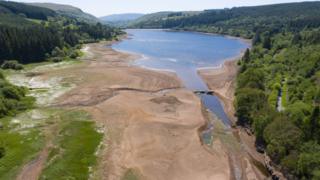
Image copyright
Getty Images
May was the sunniest calendar month on record, and spring was the sunniest spring, the Met Office has said.
The UK enjoyed 266 hours of sunshine in May – surpassing the previous record of 265 hours in June 1957.
And it is even more extraordinary following a drenching winter, with record rain in February.
Meteorologists say they are amazed at the sudden switch from extreme wet to extreme dry – it is not “British” weather.
On average the UK gets 436 hours of sunshine between March and the end of May.
Since 1929, only 10 years have had more than 500 hours. And none has got more than 555 hours.
Scientists say the recent weather in the UK has been unprecedented and astounding.
This year we’ve bathed in an extraordinary 626 hours – smashing the previous record by a “staggering” amount, one Met Office worker said.
It is because the jet stream has locked the fine weather in place, just as it locked the previous winter rainfall in place.
Image copyright
PA Media
Professor Liz Bentley, chief executive of the Royal Meteorological Society, told BBC News: “We’ve swung from a really unsettled spell with weather systems coming in off the Atlantic to a very, very settled spell.
“It’s unprecedented to see such a swing from one extreme to the other in such a short space of time. That’s what concerns me. We don’t see these things normally happening with our seasons.
“It’s part of a pattern where we’re experiencing increasingly extreme weather as the climate changes.”
Mark McCarthy, from the Met Office, said: “If we look at the difference in rainfall that’s fallen over the winter compared to spring it is the largest difference in rainfall amount in our national series from 1862.
“The sunshine statistics are really astounding.
“The stand out is by how much sunshine has broken the previous record – set in 1948. There’s been more sunshine than most of our past summer seasons. It’s quite remarkable.”
One of his colleagues described the figures as “absolutely staggering”.
Image copyright
Getty Images
The Met Office says this year is not an indicator of the future, because the jet stream might behave differently.
Scientists suspect man-made climate change may be implicated, but it is too soon to tell.
Some of them believe the rapid man-made heating of the Arctic, which has led to record temperatures and wildfires in Siberia, may be influencing the jet stream, although that is not proven.
Professor Joe Smith, chief executive of the Royal Geographical Society, told BBC News: “For many people, the recent long sunny spell is simply ‘nice weather’.
“In a wider context it’s a signal of the increasing unpredictability of the UK’s climate. Planning for the growing season is starting to resemble a night at the gambling tables.
“The fact remains that bold early actions to slash emissions can still cut the larger risks associated with climate change in the UK and around the world”.
Follow Roger on Twitter @rharrabin
Read MoreFeedzy


